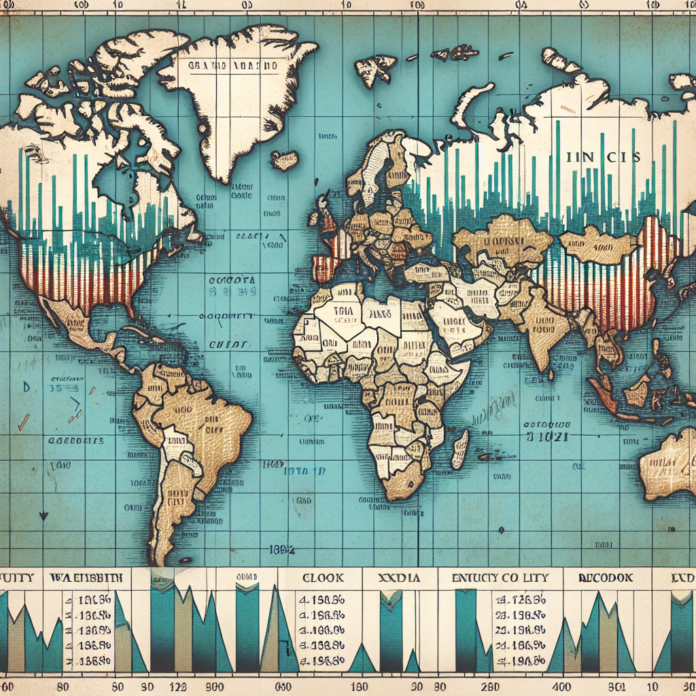The specter of recession routinely haunts global financial markets, often tripping shockwaves that resonate across equity indices around the world. As whispers of economic slowdown grow into a chorus of concern, the resultant investor trepidation is clearly mirrored in the fluctuating performances of major global indices. This article delves into the palpable impact of recession fears on global equity markets and underscores the importance of understanding this relationship in today’s interconnected economic landscape.
The Psychology of Recession Fears
Recessions connote a period of significant decline in economic activity spread across months—often visible in GDP, income, employment, and retail sales. The mere anticipation of such a period can lead to a self-fulfilling prophecy; where investors, anxious about potential losses, may decide to divert or withdraw their investments, thus contributing to a drop in equity values. Behavioral finance—the study of the influence of psychology on the behavior of investors—provides insight into this phenomenon and can be a powerful tool in explaining market dynamics.
The Correlation Between Recession Indicators and Market Response
Global equity indices, from the S&P 500 in the United States to the Nikkei 225 in Japan and the FTSE 100 in the United Kingdom, react sensitively to traditional indicators of a looming recession such as inverted yield curves, rising unemployment rates, reduced manufacturing output, and low consumer confidence. The sensitivity of these markets can often result in significant volatility, prompting investors to look for safer havens. Keeping abreast with key economic indicators through platforms like Trading Economics (https://www.tradingeconomics.com) can help investors identify early signals of a potential slump.
Impact on Global Indices: Fleeing to Safety
The anticipation of a recession can skew investor preference towards less risky assets, leading to outflows from stocks to bonds and gold. This risk aversion triggers sell-offs in equity markets, depressing global indices. The interconnectivity of global markets means that a ripple effect is often seen, wherein a major index’s downturn can affect others worldwide. Diversified financial news resources like Bloomberg (https://www.bloomberg.com) often report on these shifts in investor sentiment and the consequent impact on global indices.
Sector-Specific Impacts During Recession Fears
Not all sectors are impacted equally by the threat of recession. Cyclical sectors such as technology, automotive, and consumer discretionary often bear the brunt of pullbacks during economic anxiety, while non-cyclical sectors such as utilities and consumer staples may be perceived as more resilient investments. The Wall Street Journal’s Market Data (https://www.wsj.com/market-data) is a valuable resource for tracking the performance of different sectors in real-time.
Emerging Markets: The Dual-Edged Sword
Emerging market indices are particularly sensitive to recession fears due to their perceived higher risk. On the one hand, capital outflows from these markets can be stark as investors seek safety, but on the other hand, they can also become attractive investment destinations due to lower valuations and the potential for higher returns. Monitoring emerging markets through specialized platforms such as the Financial Times’ Emerging Markets hub (https://www.ft.com/emerging-markets) can offer investors a nuanced understanding of these dynamics.
Navigating Recession Fears as an Investor
For investors, navigating through periods marked by recession fears requires a balanced approach, combining vigilance with an understanding that equity markets have historically rebounded over the long-term. This approach involves staying informed of global economic trends, diversifying investment portfolios, and avoiding panic-driven decisions. Investors might also look to expert analysis from firms like Goldman Sachs (https://www.goldmansachs.com) for strategic perspectives during economically uncertain times.
Conclusion
In conclusion, while recession fears can send shockwaves through global equity indices, causing dips and volatility across markets, they also present considered opportunities for strategic investment and portfolio strengthening. The key for investors is to remain informed, vigilant, and not capitulate to short-term panic, but rather to make decisions with an eye on long-term objectives and historical economic cycles. By doing so, investors can weather the storm of recession fears and position themselves to capitalize on eventual market recoveries.




 AGF-B.CO
AGF-B.CO